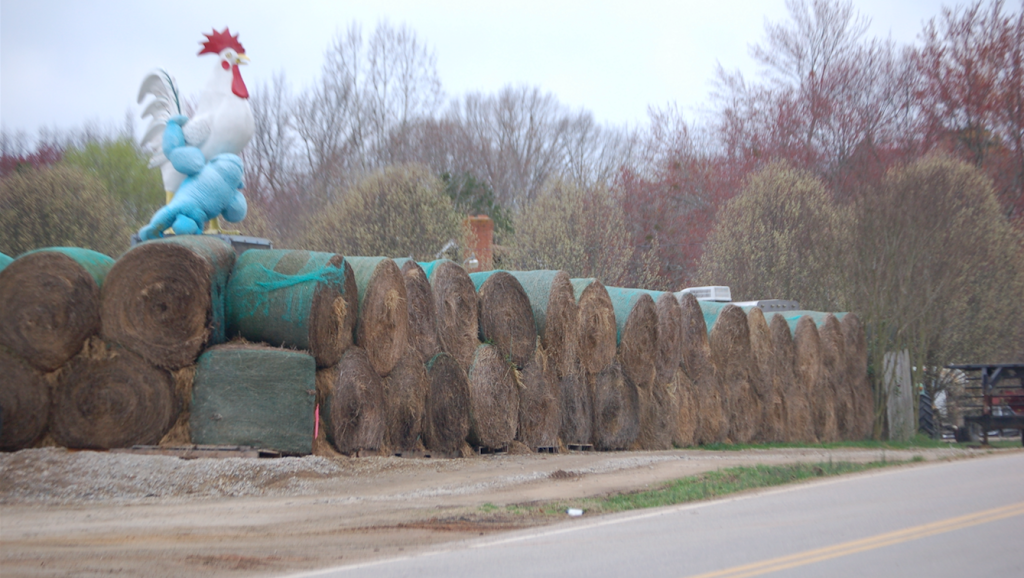Permit and fencing issues discussed
Published 2:54 pm Thursday, March 1, 2018

- Bales of hay make up the fencing along the side of 4-Wheel Drive Specialty Conversion Division Inc., located on 1936 Cartersville Road. The business’s Conditional Use Permit, which was not renewed, was a topic of discussion during the Cumberland County Planning Commission meeting Monday. (Photo by Emily Hollingsworth)
Members of the Cumberland County Planning Commission held a discussion with a business owner regarding a conditional use permit (CUP) during their monthly meeting Monday.
Mo Duncan, who owns 4-Wheel Drive Specialty Conversion Division Inc. on 1936 Cartersville Road, spoke during the public comment period and asked why the conditional use permit on his business had not been renewed.
Supervisors, during their Jan. 9 meeting, chose to not take action on renewing the permit, the February board of supervisors board packet cited. When the permit expired, they planned to meet with the owner to use stronger specifications on the permit. During a discussion period, they cited issues relating to the fencing on the property, the board packet cited.
County Administrator and Attorney Vivian Seay Giles said the permit was slated to be renewed on an annual basis.
“His CUP was to be renewed annually, and so the board took no action, and therefore it expired,” Giles said. When asked why the board did not take action, Giles said, “because he was not in compliance.”
The fencing is made up of bales of hay placed adjacent to one another throughout the property.
The business specializes in off-site collection, transportation and disposal of waste, sales and outdoor display of carports, garage or service station and manufactures Porta-Johns, a board packet from a January 2017 Cumberland County Board of Supervisors meeting cited.
Duncan said hay bales are a method used by farmers to secure properties. It cannot been seen through, and he said flame retardants could be sprayed to prevent potential fire hazards.
He noted several complications with the business location, including a sight line and a potential roundabout at the intersection of Columbia and Cartersville roads that he said would run into his property.
“I hate to spend all of this money and two years from now it’s all going to be torn down,” Duncan said.
Duncan also cited spending approximately $7,000 on material for a chain link fence, later finding out that that fencing would not comply with the conditional use permit.
“I’m kind of between a rock and a hard place,” Duncan said during the planning commission meeting. “To me a fence is a fence.”
Dr. William “Bill” Burger, commission chairman, said they did not have the paperwork in front of them regarding the conditional use permit, noting that they did not anticipate Duncan attending the meeting.
“We’ll take a look at it at the March (26) meeting and the odds of it are we will make a recommendation to the board,” Burger said.
“I would start with the conditions that were in it that we had agreed on at the last one,” Burger said, referencing the most recent conditional use permit that was renewed.
“All we can do is come up with conditions and make a recommendation to the board,” Burger said.
He said Virginia Department of Transportation (VDOT) representatives would be the best to contact regarding the potential roundabout.
Giles said VDOT has hosted community meetings regarding the roundabout.
Burger said the issue would be considered during a March 12 workshop between members of the commission but that no action would be taken until the next planning commission meeting March 26 at 6:30 p.m.
During a discussion period, members of the commission debated how to best address the permit.
District One and Vice Chairman Randy Bryant, who lives adjacent to Duncan’s business, said the property is in violation of its permit and that the commission discussed the items related to the permit with Duncan last year but the conditions had not been enforced.
“I can remember a group of us getting together and going to the planning commission in the late 1990s or early 2000s with a stated problem or problems with that business,” Bryant said. “In 17 years or more, nothing has changed. It’s only gotten worse.”
“If you don’t find some way to actually enforce and cause a change, there will be no change,” Bryant said.
District Two Commissioner Stephen Donahue said while the issues needed to be addressed, closing the business would not be the solution.
“First, regulations, ordinances, laws, however you classify them, mean nothing unless they’re enforced,” Donahue said. “But there’s too many to enforce. Secondly, I think it would be a tragedy if any business gets shut down by the planning commission.”
“I think it is a government overreach to shut a business down because the place is ugly,” Donahue said.





